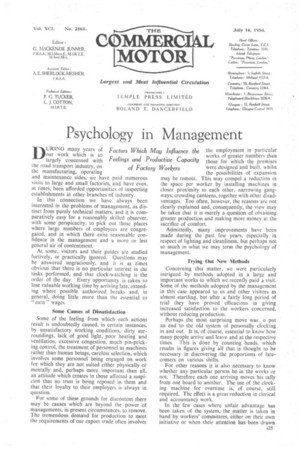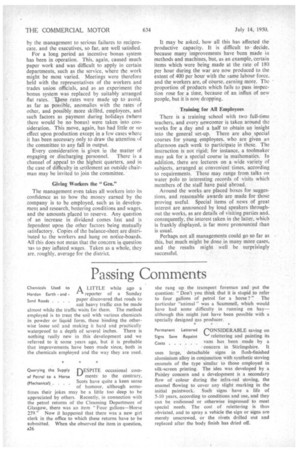Psychology in Management
Page 27

Page 28

If you've noticed an error in this article please click here to report it so we can fix it.
Factors Whic.h May Influence the Feelings and Productive Capacity of Factory Workers
DURING many years of our work which is so largely concerned with the road transport industry, on the manufacturing, operating and maintenance sides, we have paid numerous visits to large and small factories, and have even, at times, been, afforded opportunities of inspecting establishments in other branches of industry.
In this connection we have always been interested in the problems of management, as distinct from purely technical matters, and it is comparatively easy for a reasonably skilled observer, with some perspicacity, to pick out those places where large numbers of employees are congregated, and in which there exist reasonable confidence in the management and a more or less general air of contentment.
At some, visitors and their guides are studied furtively, or practically ignored. Questions may he answered ungraciously, and it is at times obvious that there is no particular interest in the tasks performed, and that clock-watching is the order of the day. Every opportunity is taken to lose valuable working time by arriving late, extending where possible •authorized breaks and, in general, doing little more than the essential to " earn " wages.
Some Causes of Dissatisfaction Some of the feeling from which such actions result is undoubtedly caused, in certain instances, by unsatisfactory working conditions, dirty surroundings, lack of good light, poor heating and ventilation, excessive cdngestion, much pin-pricking control, the treatment of personnel as machines rather than human beings, careless selection, which involves some personnel being engaged on work for which they are not suited either physically oi mentally and, perhaps more important than all, an attitude which creates in those affected a suspicion that no trust is being reposed in, them and that their loyalty, to their employers is always in question.
For some of these grounds for discontent there may be causes which are beyond the power of managements, in present circumstances, to remove. The tremendous demand for production to meet the requirements of our export trade often involves the employment in particular works of greater numbers than those for which the premises were designed and built, whilst the possibilities of expansion may be remote. This may compel a reduction in the space per worker by installing machines in closer proximity to each other, narrowing gangways, crowding canteens, together with other disadvantages. Too often, however, the reasons are not clearly explained and, consequently, the view may be taken that it is merely a question. of obtaining greater production and making more money at the sacrifice of comfort.
Admittedly, many improvements have been made during the past few, years, especially in respect of lighting and cleanliness, but perhaps not so much in what we may term the psychology of management.
Trying Out New Methods Concerning this matter, we were particularly intrigued by methods adopted in a large and important works to which we recently paid a visit. Some of the methods adopted by the management in this case appeared to us and other visitors as almost startling, but after a fairly long period of trial they have proved efficacious in giving increased satisfaction to the workers concerned, without reducing production.
Perhaps the most surprising move was o put an end to the old system of personally clocking in and out. It is, of course, essential to know how many people arrive and leave and at the respective times. This is done by counting heads, which results in figures giving all that is thought to be necessary in discovering the proportions of latecomers on various shifts.
For. other reasons it is also necessary to know whether any particular person be in the works or not. Therefore each one arriving moves his tally from one board to another. The use of the clocking machine for overtime is, of course, still required. The effect is a great reduction in clerical and accountancy work.
In the few cases where unfair advantage has been taken of the system, the matter is taken in hand by workers' committees, either on their own initiative or when their attention has been drawn by the management to serious failures to reciprocate, and the executives, so far, are well satisfied.
For a long period an incentive bonus system has been in operation. This, again, caused much paper work and was difficult to apply in certain departments, such as the service, where the work might be most varied. Meetings were therefore held with the representatives of the workers and trades union officials, and as an experiment the bonus system was replaced by suitably arranged flat rates. Ibese rates were made up to avoid, as far as possible, anomalies with the rates of other, and possibly more skilled. employees, and such factors as payment during holidays (where there would he no bonus) were taken into consideration. This move, again, has had little or no effect upon production except in a few cases where it has been necessary only to draw the attention of the committee to any fall in output.
Every consideration is given in the matter of engaging or discharging personnel. There is a channel of appeal to the highest quarters. and in the case of difficulty in settlement an outside chairman may be invited to join the committee.
Giving Workers the "Gen."
The management even takes all workers into its confidence as to how the money earned by the company is to be employed, such as in development and research, bettering conditions and wages, and the amounts placed to reserve. Any question of an increase in dividend comes last and is dependent upon the other factors being mutually 3atisfactory. Copies of the balance-sheet are distributed to the workers and hung on notice-boards. All this does not mean that the concern in question las to pay inflated wages. Taken as a whole, they are. roughly. average for the district. It may be asked, how all this has affected the productive capacity. It is difficult to decide, because many improvements have been made in methods and machines, but, as an example, certain items which were being made at the rate of 180 per hour during the war are now produced to the extent of 400 per hour with the same labour force, and the workers are, of course, earning more. The proportion of products which fails to pass inspection rose for a time, because of an influx of new people, but it is now dropping.
Training for All Employees There is a training school with two full-time teachers, and every newcomer is taken around the works for a day and a half to obtain an insight into the general set-up. There are also special courses for young employees, who are given an afternoon each week to participate in these. The instruction is not rigid: for instance, a toolmaker may ask for a special course in mathematics. In addition, there are lectures on a wide variety of subjects, arranged at convenient times, according to requirements. These may range from talks on water polo to interesting records of visits which members of the staff have paid abroad.
Around the works are placed boxes for suggestions, and reasonable awards are made for those proving useful. Special items of news of great interest are announced by loud speakers throughout the works, as are details of visiting parties and. consequently, the interest taken in the latter, which is frankly displayed, is far more pronounced than is usual.
Perhaps not all managements could go so far as this, but much might be done in many more cases, and the results might well be surprisingly successful.












































































